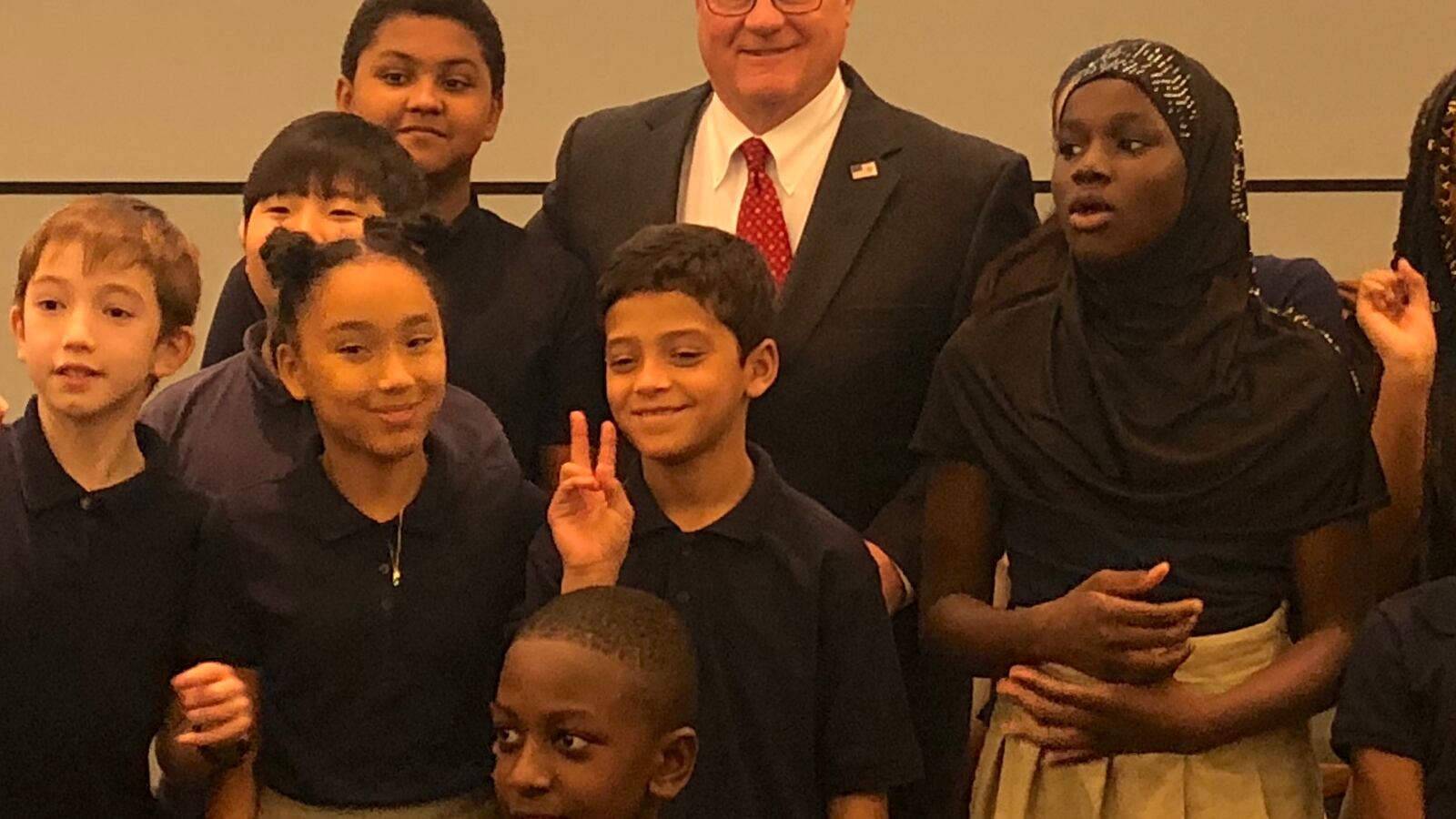This article was originally published in The Notebook. In August 2020, The Notebook became Chalkbeat Philadelphia.
Less than a month before Election Day in what has been a humdrum campaign for governor of Pennsylvania, area 4th- and 5th-grade students got a chance Tuesday to question Republican challenger Scott Wagner, a former state senator, and the incumbent, Democratic Gov. Tom Wolf.
Philadelphia students from Robert B. Pollock, Anne Frank, and E.M. Stanton Elementary Schools were among those who posed questions to the candidates at an event hosted by the Rendell Center for Civics & Civic Engagement.
They asked about school funding, safety, homelessness, standardized testing, and bullying.
The candidates appeared separately at the event, which was held in the auditorium at Philadelphia School District headquarters, 440 N. Broad St.
The city students were joined by Cynwyd Elementary students from nearby Lower Merion School District, and one of the questions came from a school district in Pittsburgh.
Gov. Wolf talks to students after answering questions during a forum at Philadelphia School District headquarters. (Photo by Darryl C. Murphy)
Before taking the questions, Wolf offered some words of encouragement to the young audience.
“Your being here, your asking these questions is really, really important,” he said. “Civics is important, our democracy is important. It is not a spectator sport. It depends on folks like you participating and molding that democracy into exactly what you want it to be.”
On behalf of his classmates, Omari Thomas, a 5th grader at Pollock, which is in the Northeast, asked the candidates what they would do about homelessness. Would there be funding for shelters? What other resources would they provide to prevent it?
In his answer, Wolf stressed efforts to stem the opioid epidemic as one way to address homelessness. “We have to make sure that we are not consigning people to a life of homelessness simply because they have the disease of substance use disorder.”
Omari came up with the question, and the class chose to present it.
“Me and my family like to support the homeless,” said Omari, 10, during a break between the candidates’ appearances. “And it’s sad [when] no one has homes and stuff, so I [wanted to see] if the governor could help and I just wrote the question.”
Wagner, answering the same question later, emphasized prevention. “Why are these people homeless?” he asked, wondering whether they had sufficient job opportunities and mental health support.
Anne Frank 5th-grade teacher Christine Delesandro said her students’ question about bullying and school safety was crafted by committee.
“The ideas they brought forward I was really surprised with,” she said. “And a lot of them talked about other things that they would want to bring to a gubernatorial candidate that I had never even thought of.”
During Wolf’s various answers, he also touted his record in increasing education funding and efforts to reduce the amount of time taken up by standardized tests.
Superintendent William Hite said he was taken by the student’s “depth of knowledge” and the breadth of their questions.
“It shows that they’re not just thinking about themselves,” he said. “They’re thinking about students across the Commonwealth.”
Wagner also proclaimed to the students, responding to a question about inequitable school funding, that “you are a victim of problems that were created by adults” and stressed the importance of adults stepping up for students.
“It’s important that we build you, we educate you, we help you be the best you can be, so as an adult you can have a great lifestyle, you can earn money, everything,” Wagner said. “You can live the American dream. I’m looking forward to being your next governor.”
The Rendell Center, founded by Ed and Marjorie Rendell, focuses on civics education and creating “an informed and responsive citizenry.” Ed Rendell, the former mayor and governor who is now the organization’s vice president, made an appearance.
He said that engaging elementary-aged children is a good idea for politicians.
“Kids these days, because of television and the internet, are thinking about real issues at a younger age,” he said.


